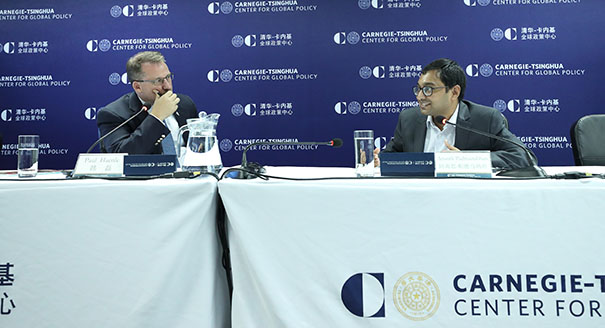Registration
You will receive an email confirming your registration.
The rapid pace of technological integration and development is shaping global governance norms and institutions. Artificial intelligence, big data, and automation are just a few of many emerging technologies that will impact governments, societies, and global governance organizations. How can the international community work together to harness the positive potential of these advancements, beyond coming to terms with and regulating the implications?
During the second part of the second annual Carnegie–Tsinghua Global Governance Conference, Carnegie–Tsinghua Center director Paul Haenle sat down with Carnegie India’s Ananth Padmanabhan for a discussion on how technological developments are transforming society in ways that affect global security and stability. They also discussed how global governance institutions can strategize to manage the challenges and opportunities in this new policy landscape.
The conversation was followed by a panel of SAIS-Tsinghua students who presented their research.
This event was held in English and Chinese with simultaneous translation available.
This event was off the record.
DISCUSSION HIGHLIGHTS
- The Difficulties of Regulating Emerging Technologies: The speaker pointed out that many of the failures of technology regulation are due to regulators’ limited conceptions of particular technologies. Innovations are only considered in their current contexts rather than in their potential applications. As such, many legislators have failed to understand the potential benefits of technologies and have improperly regulated them. The speaker cited India’s 2014 ban of drones which effectively suppressed the drone industry in India, which should be a growth sector with the potential to change the future of agriculture and delivery services, among others industries.
- The Need for International Collaboration on Technology Regulation: The speaker also discussed the challenges of getting governments to work together to regulate emerging technologies. When it is not easy to find consensus on regulations at the domestic level, achieving complete international alignment and building multi-stakeholder governance models is difficult. As today’s technology space is both diffused and very active, the speaker suggested that a more realistic aim would be to build a “soft-consensus” about broad principles of technology regulation.
- Difficulties of Innovation Competition: Competition between countries is one of the primary factors inhibiting international regulatory cooperation. Although in principle everyone agrees that a multi-stakeholder governance model is preferable, if one country pioneers a technology, it generally tends to resist regulating it in concert with others. Where no particular country is the established pioneer of a particular technology, countries often try to establish themselves as innovation leaders in that area. Yet, as soon as it becomes a race, we lose the opportunity to ensure that regulation is inclusive and forward-thinking.
- Balancing the Need for Data with Individual Protections: The Cambridge Analytica scandal has reopened the public debate about the need for citizens to own their data. Governments must quickly address these questions of data governance in order to reestablish trust among their constituents. The speaker discussed how best to balance the competing goals of data protection and improving governance through the use of data, arguing for the localization of the regulation process. While it is important for data to flow across borders, regulations should be implemented locally but according to internationally accepted principles.
Paul Haenle
Paul Haenle is the director of the Carnegie–Tsinghua Center for Global Policy based at Tsinghua University in Beijing. Haenle’s research focuses on Chinese foreign policy and U.S.-China relations.
Ananth Padmanabhan
Ananth Padmanabhan is a fellow at Carnegie India, based in New Delhi. His primary research focus is the intersection of technology, regulation, and public policy within the Indian context.
